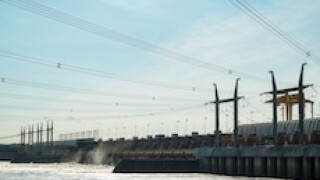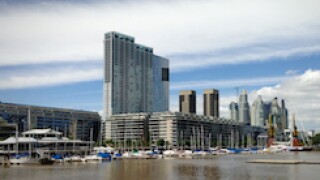Argentina
-
As Argentine assets endured a torrid Monday on the back of Mauricio Macri’s poor performance at the weekend’s primary, analysts warned that the peso’s harsh devaluation would push public debt — which is largely in hard currency — up to perilous levels. This could accelerate a sovereign default, said Capital Economics.
-
Bond market analysts said that conversations about Argentina assets would return to the likelihood of default as market-friendly president Mauricio Macri suffered a heavy defeat in Sunday’s primary elections.
-
The rout of the incumbent president Mauricio Macri in the first round of the Argentina elections has investors worried. Argentina’s debt, and that of other 'vulnerable' credits, suffered a huge sell-off early on Monday. But bankers believe that it was not so bad that the primary market will not reopen in September.
-
Compañía General de Combustibles (CGC), the Argentine oil and gas exploration and production company, will receive a rating upgrade from Standard & Poor’s if it is able to refinance a $300m 2021 note with a new bond.
-
Argentina’s leading telecoms company became the latest borrower from the country to tap international investors on Thursday, but though bond investors showed plenty of enthusiasm for Telecom Argentina’s bond comeback, some were wary about oversupply from the country.
-
Argentina’s best borrowers continue to seek to take advantage of a recently opened funding window in international markets, with Telecom Argentina plotting to sell new debt to refinance old bonds.
-
Pampa Energía followed YPF into the international bond markets on Tuesday as Argentine issuers returned after a 14 month hiatus. Investors believe there is scope for certain corporates and even provinces from the country to take advantage of renewed market access.
-
The Latin America primary bond market was quiet this week thanks to dollar investors instead enjoying the US Independence Day holiday, but bankers say sentiment is at its strongest at least since January 2018 as several of the region’s issuers lined up roadshows.
-
Bond market participants in Argentina say that more issuers from the country could look to pre-empt election-related uncertainty and take advantage of benign fundraising conditions after Pampa Energía followed in YPF’s footsteps with a 10 year deal on Tuesday.
-
Bond investors will have a chance to give a further indication of their appetite for Argentine risk as Pampa Energía looks to follow in YPF’s steps and continue to reactivate the primary markets from the country.
-
State-owned Argentine oil and gas company YPF became the first borrower from the country to tap international bond markets in 14 months on Monday. Yet despite a healthy reception from investors, bankers do not expect copycat trades from other Argentine issuers.
-
Dennis Eisele will become Credit Suisse’s head of Latin American debt capital markets in August after he ended a 19 year stint Deutsche Bank, according to an internal memo seen by GlobalCapital.











